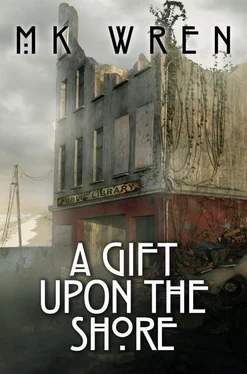Stephen laughs, then: “Why did you decide to let us stay here?”
“Well, one reason was Jeremiah’s responses to my questions.”
“What did you ask him?”
“I asked if he thought the nuclear holocaust was the Armageddon Saint John imagined, and if the second coming of Jesus was at hand.”
Stephen’s lips part. He pauses before he asks, “What did he say?”
“He said that Luke had preached that the true Armageddon hadn’t yet occurred, and that Jesus wouldn’t take so long to find the righteous if he had in fact come again to Earth.”
Stephen nods almost imperceptibly, then, “What else did you ask?”
“I asked if he believed the universe was created in seven ordinary days.”
“How did he answer that?”
“He said, ‘I don’t know.’ Profound words, Stephen. When you can say ‘I don’t know,’ you’ve freed yourself to find the answer.”
“That’s why you decided to let us stay here?”
“Yes. And you—the children. I struck a bargain with Jeremiah then. His band of refugees could make their home at Amarna, if I would be allowed to teach their children.”
Stephen doesn’t respond to that, and perhaps he’s thinking about the present dissension in this family that seems to be the ultimate result of that bargain. And I’m aware, as I wasn’t when the bargain was struck—and my failure to recognize it was hubris—that it wasn’t so much a bargain as a concession on Jerry’s part. I couldn’t have stopped him and his entourage from living here, although if I hadn’t wanted them, they’d have had to take Amarna over my dead body. I doubt that was considered an option. Not then.
Stephen says, “There was a letter, wasn’t there? From Brother Luke?” And when I frown absently at him, he adds: “Jeremiah told me about it. I asked him if I could read Brother Luke’s journal—”
“Oh, yes. Is he going to let you read it?”
“Well, he said I could, but that was before…” His shoulders rise in an uneasy shrug. “Anyway, while we were talking about that, Jeremiah said you had something else Brother Luke had written. He said he carried a letter from the Ark and gave it to you that first day.”
“So he did.” I’m a little surprised that Jerry mentioned the letter. At the time he gave it to me, he didn’t ask to read it, nor has he spoken of it in all these years. Perhaps it is in his mind sacrosanct. And I’ve never offered to let him read it. It was a very private communication, and I wasn’t sure Luke would want anyone else to see it.
But perhaps the time has come for Luke’s last words to be heard.
Time for his son to hear them.
“I’ll read the letter, Stephen, but not today. I want Jeremiah to hear it, too. Tomorrow. I’ll talk to him about it later.”
“And will that be the end of the Chronicle?”
“Yes. I suppose it will be a fitting epilogue.” I study him, trying to read behind his dark eyes. “What do you think of the story, Stephen?”
He clasps his long hands in his lap, staring at them, then looks up at me. “I’m glad you told me the story. I don’t know if I understand everything about it yet, but… maybe I will. Someday.”
That’s all I asked and hoped for. Then I lean forward, push myself to my feet. “We’ve both had lessons enough for today. Let’s go down to the beach. I need a little time with the sea.”
And do I need the protection of his company?
Damn her. She’s closed me in an invisible cage, and I despise it.
Just before supper I go out to the breezeway to get wood to fill the wood boxes in the house. The wind funnels through the narrow space, carrying the smell of rain. I balance my load—only five small pieces; I can’t carry more at a time—on one arm, but pause when I hear voices. Jonathan and Stephen are running toward the backdoor. They’ve been helping Jerry cut trees again; both of them are carrying axes.
“I think we should blow up the big stump,” Jonathan says.
Stephen scoffs. “Sure. What’re you going to blow it up with?”
“Dynamite. There’s still some left. I remember when Jeremiah blew out the pond in the north pasture. Bet you don’t remember. You were too little.”
I don’t hear Stephen’s response. They pile into the house, slamming the door behind them, and the wood falls from my suddenly lifeless arm and thuds on the concrete.
Dynamite .
The image springs whole out of memory: a fountain of black earth, a billowing cloud of dust. And what an incredible thing the human mind is. The mind leaps chasms, plunges into nothingness, and comes up with a trapeze.
One thing I’m sure of at this moment: it was an error to think that Miriam must kill me to negate my influence. She has only to destroy what is most vital to me.
The books. The vault.
It hadn’t occurred to me before. I suppose I didn’t think it was possible. But it is. Nobel’s legacy to the world may yet destroy mine.
“Oh—Mary, I didn’t know you were here.”
Esther has come out the backdoor. She sees the wedges of wood on the concrete and hurries toward me. “Did you hurt yourself?”
“No, Esther.” She starts picking up the wood, and I tell her, “Here, I’ll take that.”
“Maybe you had too big a load.” She is solicitous as always, yet she seems to be having trouble meeting my eye. She balances three pieces in the crook of my arm. “That’s enough, I think.”
I don’t argue with her, but take my light load into the house and deposit it in the wood box by the living-room fireplace. When I go back for more, I find that Esther has detailed Stephen and Jonathan to assist me. I leave the job to them, go out on the deck, and feel the damp wind in my face. I’m shaking badly, but I can’t seem to stop it.
Again, I consider Miriam’s options.
If she has decided to negate me by destroying the vault, it must still seem an act of god. Would a dynamite blast fill that bill? Yes. If Miriam can’t be connected with it. I can imagine it. In the middle of the night the silence is broken by a rumbling explosion, and the family starts from their beds, and Miriam, snug in hers, wakes from a sound sleep and asks in convincing innocence, “What happened?”
She could manage that—slip out in the deep of night, take a lantern to light her way, place the dynamite and leave a long fuse, long enough for her to run back to the house, get into bed, and seem to be sleeping when her god strikes the vault and its evil contents a thundering blow.
But doesn’t she think I, at least, will call that explosion an act of man? Rather, of woman. Doesn’t she think I will remind the others of the dynamite?
Perhaps she hasn’t thought that far. Perhaps she’s too obsessed to look past that act of god—the act of a vengeful, jealous god.
Or perhaps she knows this family better than I do. She knows their mood now, knows they aren’t likely to examine closely her act of god. They’ll accept the destruction of the vault as an act of god just as they accept the destruction of the temple in Jerusalem as an act of god because Jesus predicted it. That the prediction was recorded years after the temple was in rubble doesn’t matter to them. They are ready to have me repudiated by a higher authority. Then they can in good conscience join Miriam in repudiating me. Join . That’s the key. This family lives too near the edge of survival to tolerate schism.
I leave the deck and walk across the wind-rippled grass to the head of the path, look down at the beach where ships of foam scud across the sand. I’m not afraid to stand in such a dangerous place now. Miriam won’t bother to push me into the ravine. She doesn’t need to.
“Mary?” I turn and see Isaac running toward me with his swaying, graceless gait, and his smile is a beatitude. When he reaches me, I put my arm around his frail shoulders.
Читать дальше












